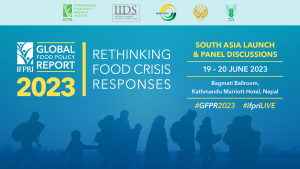The flagship publication of IFPRI—the Global Food Policy Report (GFPR)—is published annually on contemporary policy issues impacting our food and agricultural systems. This year’s report focuses on the response to food crises and the need to move toward better prediction, preparation, and resilience building that can make future crises less devastating.
IFPRI-SAR has had a tradition of organizing the launch of the GFPR in different South-Asian countries each year and this year, we will be organizing it in Kathmandu, Nepal, on 19-20 June. For the 2023 GFPR South Asia launch discussion, we are bringing together policymakers and key national stakeholders from countries across the region to share their thoughts and experiences to explore how diverse policy responses can help reduce the immediate and longer-term impacts of food crises and improve livelihoods, incomes, and food and nutrition security.
During recent crises, food systems in South Asia proved to be resilient in many ways, and a range of promising approaches have been tried out to promote greater resilience along with other development goals. Understanding these strengths can help stakeholders rethink the way forward and build on what works, as they respond to new crises. In this context, panel discussions on various aspects of ‘Building Resilient Food Crisis Response in South Asia’ have been planned for June 19-20, 2023, during the South Asia launch of the 2023 GFPR.
The major objectives of the panel discussions include the following:
• Identify gaps in the current monitoring systems and add new processes to existing systems that allow for faster identification and responses to food crisis situations in South Asia.
• Suggest mechanisms to support accountable governance, effective institutions, and policy programming that can facilitate the long-term resilience of food systems in the region.
• Examine the effectiveness of different humanitarian assistance approaches and anticipatory action programs for protecting food and nutrition security — particularly in fragile and conflict-affected settings.
• Understand how economic vulnerability affects different population groups in South Asia (including women, children, elderly, disabled persons, and other vulnerable groups) and how to develop social protection systems to be more targeted and shock responsive.
• Assess repurposing existing investments to help expand and prioritize efficient crisis response funding and leveraging private sector funds to bolster investment in long-term resilience.


